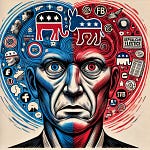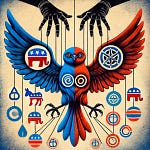Greetings and welcome to another episode of Spiritual Sundays. I am your host, Franklin O’Kanu, and in today’s podcast, I discuss the concept of freedom versus slavery. While this may sound generic, I argue we have not truly experienced real freedom in human history. However, we do have some examples in the Bible.
The pandemic has sparked a significant movement focused on being free, but I argue we don’t fully comprehend what keeps us in slavery. Two major factors that maintain our state of bondage are:
1. Government
2. Money, specifically debt, interest, and credit
We often don’t pay enough attention to finance because we don’t realize how it rules the world at a high, metaphysical level. Across various religions, the concept of having one’s sins forgiven has a spiritual basis, but had a financial implication as well.
Examining history, we can see how financial motives have shaped major events. For instance, America sought religious freedom, but it also broke away from England due to banking charter disputes. Similarly, many historical wars, often attributed to evil entities like Nazi Germany, also had underlying financial strategies.
This podcast delves into the metaphysical aspects of money and finance. We discuss Babylonian magic and the beginnings of civilization in Ur and Sumer, where magic was used in attempts to control humanity and form the first civilizations. Propaganda and occult magic were employed to establish mental constructs that created our modern practices of civilization.
These constructs have evolved over time and are now used to enslave populations without their knowledge. It’s a fascinating topic that reveals how deeply ingrained these systems are in our society.
I hope you enjoy this podcast. Please share your thoughts and feedback. Without further ado, let's dive into this episode. Thanks for listening, and Ashe!
Podcast Timestamp Summary
Introduction (Timestamp: 00:00 - 00:16)
Summary: Brief introduction to the podcast's topic "Freedom vs. Slavery."
Key Points: Introduction of the theme for today's episode.
Main Topic: Freedom vs. Slavery (Timestamp: 00:16 - 10:16)
Summary: Franklin O'Kanu delves into the concept of freedom vs. slavery, drawing parallels between modern America and ancient Babylon, and discussing the use of debt as a tool for control.
Key Points:
Historical Context (00:16 - 00:55): Introduction of the broader conversation for June and how freedom vs. slavery ties into multiple avenues.
Ancient Babylon (00:55 - 01:37): Comparison of America to ancient Babylon, focusing on debt.
Formation of Civilization (01:37 - 01:55): Discussion on how the first civilization, Babylon, managed large populations.
Mental Constructs (01:55 - 03:06): Introduction to Babylonian magic and its role in creating mental perspectives for control.
Mental and Physical Realms (03:06 - 04:11): Explanation of how mental constructs translate into physical reality.
Evaluating Constructs (04:11 - 04:54): Importance of evaluating the mental constructs we've been taught.
Timeframe Highlights:
00:35 - 00:55: Modern parallels with Babylon.
01:55 - 03:06: Mental techniques in early civilizations.
03:36 - 04:11: Mental constructs leading to physical realities.
Exploring Freedom (Timestamp: 04:54 - 09:37)
Summary: Discussion on what true freedom looks like, examining historical and modern perspectives.
Key Points:
Modern Perception (04:54 - 05:30): Exploration of freedom post-pandemic and the idea of freedom fighters.
Higher Perspective (05:30 - 06:20): Theoretical discussion on a free society being a heaven on earth.
Historical Examples (06:20 - 09:07): Examination of historical figures like Abraham, Jabez, and Job as early examples of freedom.
Barriers to Freedom (09:07 - 09:37): Introduction to the two biggest barriers to true freedom: governance and debt.
Timeframe Highlights:
05:14 - 05:30: Post-pandemic freedom fighters.
06:20 - 07:35: Historical examples of freedom.
09:07 - 09:37: Introduction to barriers.
Barriers to Freedom: Governance and Debt (Timestamp: 09:37 - 18:09)
Summary: In-depth analysis of governance and debt as barriers to freedom, focusing on their artificial and mental construct nature.
Key Points:
Governance (09:37 - 12:06): Discussion on the mental construct of government and its impact on freedom.
Debt (12:06 - 18:09): Examination of debt as a form of slavery, including historical perspectives and the role of interest.
Timeframe Highlights:
09:37 - 10:16: Introduction to governance as a barrier.
12:35 - 13:29: Debt as a mental construct and its implications.
13:46 - 14:18: The role of debt in maintaining power historically.
Historical Analysis: Banking and Wars (Timestamp: 18:09 - 25:21)
Summary: Exploration of historical events such as the American Revolution and World Wars through the lens of banking and debt.
Key Points:
Banker's Wars (18:09 - 22:55): Analysis of major wars being influenced by banking interests.
Biblical and Islamic Views (22:55 - 25:21): Examination of debt in religious texts and its implications on freedom.
Timeframe Highlights:
18:09 - 19:21: Example of the American Revolution.
19:21 - 22:55: World War I and II from a banking perspective.
22:55 - 25:21: Religious perspectives on debt.
Current Implications and Actionable Insights (Timestamp: 25:21 - 30:00)
Summary: Discussion on current implications of debt and governance, and actionable insights on how to achieve true freedom.
Key Points:
Breaking the Illusion (25:21 - 26:23): Understanding the illusion of debt and governance.
Financial Literacy (26:23 - 29:45): Importance of understanding money and changing mental perceptions about debt.
Ultimate Freedom (29:45 - 30:00): Concept of achieving physical and spiritual freedom.
Action Items:
Evaluate Mental Constructs: Reflect on and challenge existing mental constructs about governance and debt.
Increase Financial Literacy: Educate oneself on the true nature of money and debt.
Pursue True Freedom: Aim for physical and spiritual freedom by overcoming the barriers of governance and debt.
Conclusion (Timestamp: 30:00 - 32:40)
Summary: Recap of key points discussed in the episode and closing remarks.
Action Items:
Reflect on Debt: Consider the necessity and impact of debt on personal and societal levels.
Engage in Discussions: Encourage listeners to share their thoughts and continue the conversation on freedom vs. slavery.
Call To Action
If you enjoyed this article, please consider taking action to show your appreciation.
You can share it with a friend, restack it with your thoughts, or leave a comment with feedback.
If you really enjoyed it, you can become a paid subscriber or make a small donation.
If you found this article insightful, you might enjoy the wealth of knowledge in the book. Signed copies are available for a more personal touch.
The History of You: A Book That Connects the Past, the Present, and the Future
“So Franklin, if I were to ask you, what is this book about? What would you say?” “I would say that this book is a story about YOU. It’s about YOUR life.”Unorthodoxy is a reader-supported publication. To receive new posts and support my work, consider becoming a free or paid subscriber.
Listen to this episode with a 7-day free trial
Subscribe to Unorthodoxy to listen to this post and get 7 days of free access to the full post archives.















